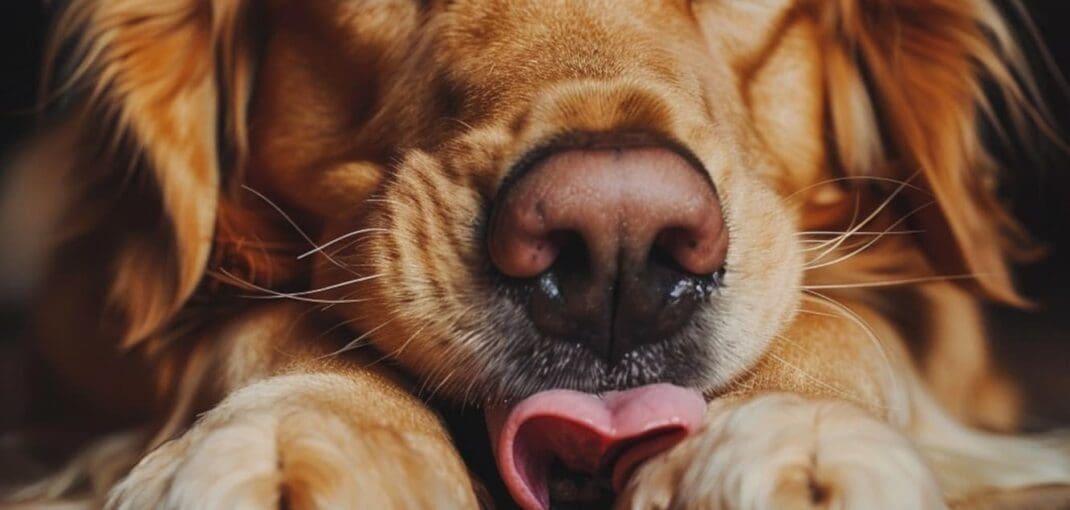A dog’s paw licking can have many causes, from trivial causes such as wanting to clean their paws after a walk, to more serious health or behavioural problems. Understanding the causes of this behaviour is key to preventing possible complications. In this article, we will discuss why your dog licks his paws, what the causes may be, and how to address the problem to ensure your pet’s health and comfort.
Is paw licking in a dog normal? When should it be worrying?
Paw licking by your dog can be a perfectly normal behaviour. Usually dogs do this after a walk to clean them of dirt, mud or salt, especially in winter. A dog also licks its paws for self-care, which in itself is not a cause for concern. However, if the pet spends a lot of time on this activity, this behaviour may indicate a deeper health or behavioural problem. When a dog licks its paws too often, pay attention to whether other symptoms such as redness, swelling, blisters or visible sores appear. When such symptoms appear, there is a risk of infection or allergic reaction. It is particularly worrying if the dog licks its paws until they bleed, which requires immediate consultation with a vet.
Why does a dog lick its paws? The most common causes
Paw licking can be a symptom of both physical and psychological problems in a dog. Most often it is caused by allergies, infections or stress, but it can also result from mechanical trauma, such as a stuck ear of grass or an insect bite. Regular paw licking can lead to further complications such as skin infections or wounds, so it is important to recognise and eliminate the cause quickly.
How do you recognise allergies that may be the cause of paw licking?
One of the most common reasons why a dog keeps licking its paws is allergies. Allergies can be triggered by a variety of things, including foods, pollen, dust, mites or chemicals used on pavements. Allergy-induced itching most commonly affects the front paws, and excessive licking can lead to skin irritation.
A solution may be to change your dog’s diet to mono-protein dog foods, which are hypoallergenic and can reduce the risk of food allergies. It is also worth paying attention to your dog’s environment and avoiding areas where allergens may be present.
Bacterial and fungal infections as a cause of paw licking
Bacterial and fungal infections may also explain why the dog licks its paws from underneath. Excessive licking causes the skin to become moist, which encourages the growth of fungi and bacteria. Signs of infection include redness, paw odour and purulent discharge. If this is the case, a visit to the veterinarian is necessary, who can prescribe appropriate medication. Animals that frequently walk in damp or dirty areas are more prone to such infections. It is also a good idea to regularly check your dog’s paws after walks and ensure proper hygiene to reduce the risk of infection.
Can stress and boredom be the cause of paw licking?
When a dog is experiencing stress, frustration or boredom, it may start licking its paws in a compulsive way. This is very noticeable because the animal will not stop doing it. He may even be aggressive when you want to stop him licking his paws. If you don’t know why your dog is licking its front paws, here’s a hint! It may be an emotional coping mechanism, similar to nail biting in humans.
Dogs need the right amount of exercise, interaction with their handler and mental stimulation. Otherwise, their frustration can lead to this behaviour. If your dog licks his paws in one place or does so habitually, it is worth increasing his physical and mental activity. Daily walks, playtime and interaction with other dogs can help alleviate stress and keep your pet occupied for longer. It’s also a good idea to give your dog health-boosting treats, which will not only keep him entertained but also boost his health.
When can paw licking indicate a health problem? Infections and injuries
Frequent paw licking can indicate an injury, such as a stuck ear of grass, a small piece of glass or an insect bite. In such cases, the dog may lick the area that hurts in an attempt to alleviate the pain or discomfort. If the dog licks the paw in one place, the paw should be carefully inspected for any visible damage.
Also, parasitic infections such as fleas and ticks can cause excessive licking. In such cases, the dog’s skin becomes very itchy, prompting him to lick and scratch constantly.
How to prevent excessive paw licking in a dog?
To prevent excessive paw licking, the key is to find out what is causing it. In the case of food or environmental allergies, changing your dog’s diet to grain-free dog food or limiting contact with allergens can provide relief. Regular paw care after walks is also important. This is especially important during the winter season, when salt on pavements can irritate the skin.
For behavioural problems, such as stress or boredom, it is worth increasing the amount of physical activity and providing mental stimulation for your dog. Longer walks, ball games or other interactive forms of play can effectively keep your dog occupied and prevent compulsive behaviour such as paw licking.
When to consult a vet if your dog licks his paws?
If your dog licks his paws until they bleed, you notice swelling, sores or paw secretions, it is essential to consult your vet immediately. Symptoms such as chronic licking, itching, and skin lesions may be indicative of serious health problems such as bacterial infections, fungal infections, parasites or autoimmune diseases.
Regular monitoring of your dog’s health and prompt intervention for paw problems will avoid complications and keep your pet comfortable. Paw licking may seem like an innocent behaviour, but if it becomes obsessive, appropriate steps should be taken to protect your dog’s health.
A dog’s paw licking can be both a normal behaviour and a sign of a more serious health or behavioural problem. The key is to observe your dog and respond to any changes in their behaviour. Making appropriate dietary changes, as well as providing activity and mental stimulation, can help to resolve the problem. Remember, if the problem escalates or you notice worrying symptoms, it is worth consulting your vet as soon as possible.






